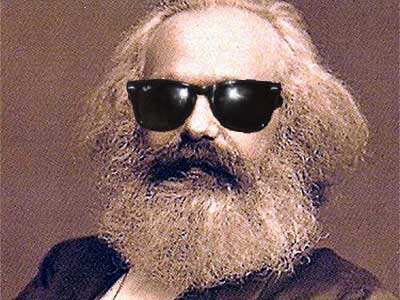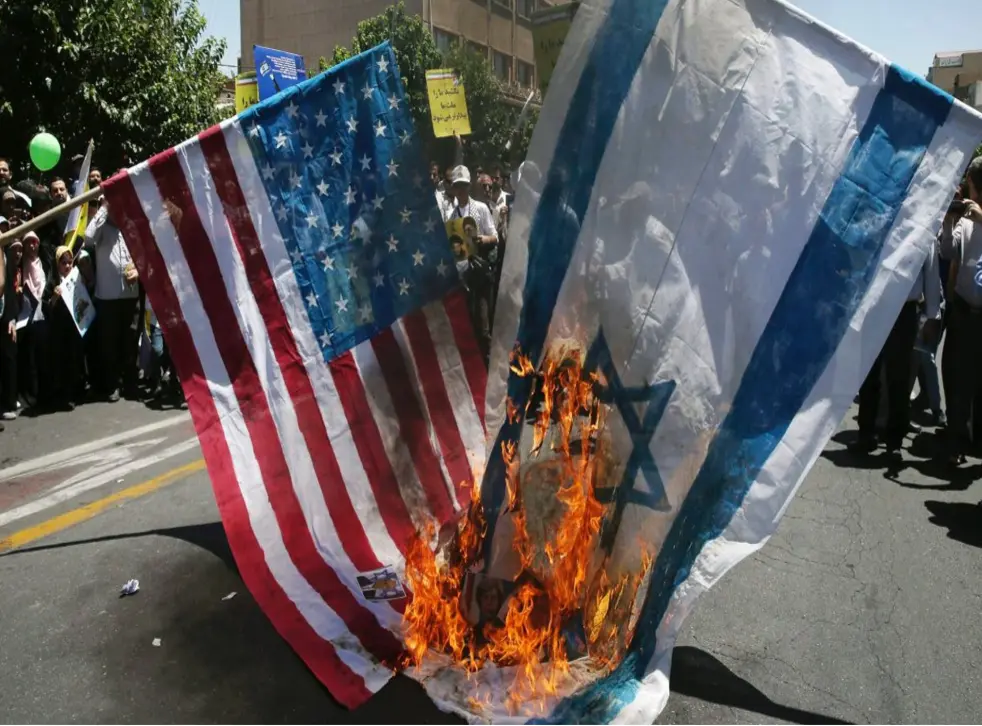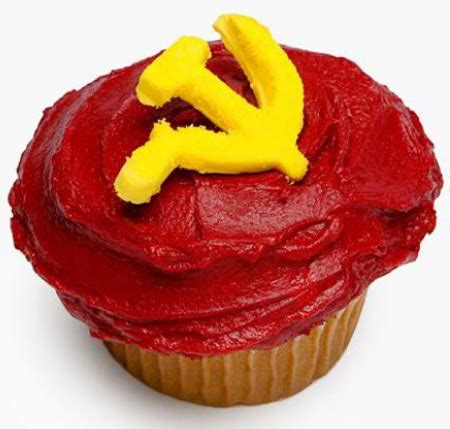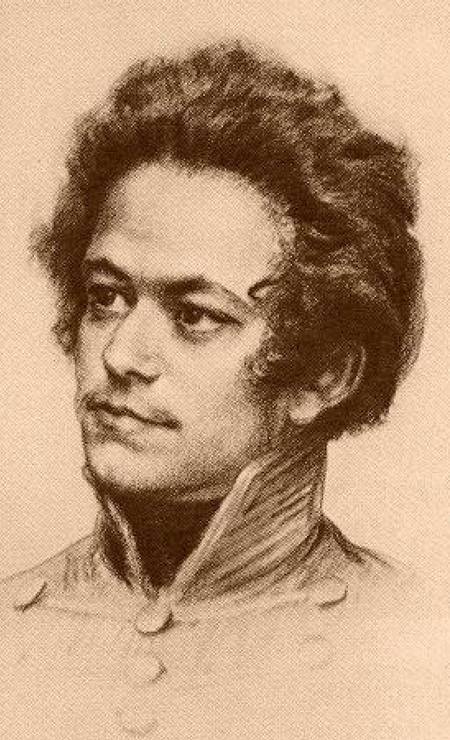Edit for clarity: I’m not asking why the Tankie/Anarchist grudge exist. I’m curious about what information sources - mentors, friends, books, TV, cultural osmosis, conveys that information to people. Where do individuals encounter this information and how does it become important to them. It’s an anthropology question about a contemporary culture rather than a question about the history of leftism.
I’ve been thinking about this a bit lately. Newly minted Anarchists have to learn to hate Lenin and Stalin and whoever else they have a grudge against. They have to encounter some materials or teacher who teaches them “Yeah these guys, you have to hate these guys and it has to be super-personal like they kicked your dog. You have to be extremely angry about it and treat anyone who doesn’t disavow them as though they’re literally going to kill you.”
Like there’s some process of enculturation there, of being brought in to the culture of anarchism, and there’s a process where anarchists learn this thing that all (most?) anarchists know and agree on.
Idk, just anthropology brain anthropologying. Cause like if someone or something didn’t teach you this why would you care so much?
A big part of it is that it’s more aggrandizing and exhilarating to see yourself or your entity or alignment as “against the whole world”, instead of “positioned in calculated opposition to certain things and somewhat aligned with the rises and falls of many historical formations”, many of which take a whole lot of convincing and nuance because of how many pitfalls they fell for.
Someone really diving into an anarchist identity (not a meaningless liberal one) will either draw on histories of anarchists being suppressed or otherwise at odds with the USSR, or on much more recent queer and punk and insurrectionary authors who are critical of all party formations that seek to contend with governing atop entire countries. The latter will typically identify the CPSU as the most successful (fwiw) of these, and readily associate it with many modern-day communist parties, which they do have more of a direct experience of.
So far as the typical American goes, I’m assuming that in a lot of cases they don’t learn to hate the USSR via becoming anarchist, they’ve already internalized the historical grudge beforehand.
My two cents? A lot of what they do can have a place, but largely as a way of establishing stopgap solutions or dual power structures where existing government has failed. A foundation to be iterated upon or ultimately obsoleted with something more structured and permanent, not a stable end result in and of itself.
Probably in the minority with this one, my “grudge” originates from reading this: https://theanarchistlibrary.org/library/the-anarchist-faq-editorial-collective-an-anarchist-faq-full#toc562
And while it’s much more toned down since then, it is still present as what you describe as “You have to be extremely angry about it and treat anyone who doesn’t disavow them as though they’re literally going to kill you.” - which from my perspective is more like that the leaders of the USSR tended to resort to abuse of power in order to hold power and MLs are very vehement about the fact that these were no big deals or even were completely necessary to keep the project going, while, coming from anarchist circles, from my perspective these events change the nature of the project itself. This is mostly why i can relate to trots more - they are not afraid to call out what they perceive as self-serving use of power as mistakes, or even crimes.
Disclaimer: This does not apply to all or even most anarchists, and may apply to, like, 5, because it’s my personal impression from a handful of miserable encounters.
As a USSR-specific example, since that’s what you’re asking for, there are some anarchists who are evidently taught that Nestor Makhno was a brave resistance fighter rather than a negligent armer of pogroms and leader of aremoved gang (though probably not personal participant, he just let his men do it). Having this image of a champion of freedom and then hearing how he was militarily crushed by the Bolsheviks, naturally they will resent the USSR as counter-revolutionary. Spain is obviously another example, where the SU’s role gets contorted from “didn’t help the anarchists as much as it could have” to “personally killed anarchists in parallel to the Francoists killing anarchists”
Edit: Down in the thread there’s some direct evidence of the romantic tragedy of Makhno being played out yet again.
I don’t think that’s most of them, but I think a lot of them have these kinds of stories in mind that lead them to deciding the tankies are evil. Honestly with new anarchists who do this shit, it comes off to me as a way to become a political minority, to be involved in a grand historical struggle against the “statists” who always kill anarchists like you (now that you’ve become and anarchist). Like, in liberal society and not incorrectly, there’s a solemnity with which Jewish identities are treated because, in large part, of their ancestral connection to the Holocaust. I have talked to some anarchists that really come across as wanting to opt in to having ancestral oppression like that even if they’re as white as untrod snow, and this is a way to do it. I have seriously seen some unironically talk about how Stalin killed “us” as though stanning Makhno or whoever retroactively makes them actually part of that group.
Reread the disclaimer.
 9·1 hour ago
9·1 hour agoReread the disclaimer.
HELP, I’m stuck in a loop and I can’t stop re-reading this comment.
I was never good at writing code

They arrive as radicalized liberals who already “know” how bad communism is, and anarchism seems to offer a kind of 3rd way (enlightened centrism?) that rejects the apparatus of the state. After that, they either don’t think much more about it and just get to work, or they read a bunch of history and grind that axe. Or they change their mind :)
Why hasn’t anarchism been done already (on a large scale)? “It would have, but the tankies keep subverting revolutions and doing states, and they give a bad name to leftists which turns people away from anarchism,” is a pretty convenient answer to that. Plus, by distancing themselves from us and from past revolutions, they can try to pass themselves off as “one of the good ones” while preserving an image of how they want things to be without having to defend any messiness of actually getting there. It’s much simpler to write off projects entirely as not being genuine attempts because the bad people took charge than to actually study them and confront the complex problems they faced.
FBI heavily supported sectarian anarchism in the 1960s
There was no red scare for anarchism, so it’s much easier to go from liberal -> anarchist than it is to go liberal -> communist. If you take the former route, the propaganda around communism never truly fads. Also doesn’t help that anarchists are typically the most active block of organizers/protestors/activists in the states. Communist orgs a lot of the time are just glorified book clubs, if you want to feed people, build bus benches, do a coat drive, counter-protest police, or whatever else, the people who are often at the forefront of this are anarchists. There is absolutely an image of the “academic communist” too concerned this theory specifics and sectarian lines to do any real action. This stereotype is rooted in some level of truth. I became disillusioned with anarchism, remaining steadfast that a vanguard party is key to true revolutionary change, yet in my own circles and among those I organize with, the communists in that camp simply do not organize, they do not. If you need advice on what book to read? They are the people to go to. If you need advice on mobilizing your neighborhood? You go to the anarchists. When I speak with communists I’m met with defeatism and often, an inflated sense of self-superiority. What is theory without practice? and to the anarchists: What is practice without theory?
It wasn’t always this way, and it doesn’t have to be this way. In the States there’s no doubt that our synthesis of theory and material conditions will be a blend of both camps.
There was no red scare for anarchism
There was, but the black scare about syndicalists and anarchist dynamiters happened half a century earlier. It was a huge part of turn of the century labor struggles in the US.
yeah I suppose it would be better to say “the red scare is more recent, and anarchism has a more accepted culture built around it” (ie punk, see: hot topic joke below)
anarchism hasn’t been a geopolitical threat to
 hegemony so the hate machine isn’t spun up.
hegemony so the hate machine isn’t spun up.if there were a major anarchist insurgency somewhere relevant or a longstanding thorn in the empire’s paw like Cuba is they’d be more overt in marketing the repression.
the green scare and WTO protests of the 90s definitely targeted anarchists. the ALF and ELF were the FBI’s major concerns of domestic insurrection even while mcveigh and other nazis were bombing federal buildings.
Good post. A agree on mostly finding anarchists in the streets. They seem a lot more willing to put boots on pavement, often alongside well meaning libs, religious groups, and de-politicized people who non-the-less turn up when it counts.
If i’m remembering my history right there were a good number of black scares but they were mostly in the 19th century. After wwi the reds really overshadowed the anarchists and i think they kind of faded as a threat in the face of the ussr as an emerging super power. Sacco and Vazetti are the most famous anarchist martyrs in the us but they were in good company and it was a regretfully large company.
My radicalization started with identifying with anarchism, because I hadn’t yet shed the internalized red scare propaganda
After that I wanted to take leftist unity seriously and started to read Lenin and Mao in good faith, nowadays I claim to be either one based on which would piss off the listener the most (so usually communist, libs aren’t really scared of anarchists where I live)
tfw you become a martyr for anarchism and don’t even get merch in Hot Topic

74 comments 65 upbears oh no what have i done : (
You created great discussion, is what you did. Good post is good.
well I see more

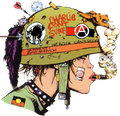
 rather than
rather than  so you’ve done ok I guess
so you’ve done ok I guess
As an ancom couple of maybe trite observations from the POV of modern anarchists rather than rehashing centuries old debates:
Many anarchists are deeply unserious people about actual politics and building a society. The things that many of them like about anarchism are this misleading idea of “no rules”, they are effectively antisocial or better crystalize the meaning anti-society.
There are anarchist tendencies that effectively nurture their preconceived notions about the background unsatisfaction most people have with their lot in life. Tendencies like anarcho-egoists, anprims, etc. that allow people to romanticize their own feelings.
Lastly very few anarchists tend to understand what anarchism is, just like many people fail to understand what communism is. Anarchism in it’s purest form is about finding the fairest way of building a collective society while respecting everyone as individuals. It is philosophically an ideology that is trying to find the philosophical and practical underpinnings of coalescing individualist and collectivist into one comprehensive view in a bottom up fashion. A nice metaphor for this is that in physics many people are trying to unite classical physics with quantum mechanics to create a comprehensive theory of physics, rather than two separate fields of study. Anarchists want their societies to have unconcerned unanimous support of how the society is governed. Anarchists are not willing to compromise a their platforms. So that makes it difficult to work through problems that other political movements can take “shortcuts” in. In short if you think about this through the lens of standard democratic centralism, Anarchists do not accept a rule of simple majority, they will only accept unanimous consent.
Anarchists that do not understand this, typically hate communists reflexively depending on their platform or who they hang out with. Anarchists that do understand this, typically hate communists due to communism’s prescribed nature of the problem and solution coupled with the tendency for socialist societies who attempted to build communism to prioritize their implementation at the cost of everything else, as well as failure of communist countries to truly liberate certain groups and use them as political pawns when its expedient.
I think a lot of this hate comes from the reality of the development of humanity in the 20th century. The second industrial revolution essentially forced all developing countries of the time into societies that were in practice extremely hierarchical, extremely parochial, and extremely focused on extracting production of out of individuals. Anarchists see this as a negative development in both the liberal and socialist worlds, and due to street cred of anarchism as the “no rules” punk philosophy Western anarchists, many of whom that have never known hunger or poverty relative to their global South or Eastern European counter parts, typically see liberals as the less worse choice because capitalist liberalization did allow for more individualism at it’s apex.
Lastly there is a real history of bad blood between the primary standard bearers of socialism in the USSR and anarchists. The bolsheviks regardless of the morality or solidarity of their actions were some of the best political operators of the 20th century. They were able to take a rump committee of a besieged and nascent political movement and transform it into a global political powerhouse. Some of the best political operators in the world worked on Bolshevik standards, Lenin, Stalin, Kim, Tito, Sankara, Mao initially and (I’m gonna get flack for this but it’s fucking true because of what he was able to fucking pull off politically if you actually read history) Ben-Gurion. The problem is bolshevism is ruthless, and it cannot stand competition. It must be the only voice in the room. That’s how it works, that’s why it was effective. And in that efficacy lays the simple fact that Bolsheviks betrayed the largest anarchist organization during the Russian revolution.
Makhnovshchina was the pinnacle of anarchist success on the world stage. Their lands were ruled by their people. They had repelled not only German colonists but the German backed puppet regimes spouting racist and cosplay style Ukrainian Nationalism They fought a multi-front war between the Whites and the Reds. To the point where they beat back the Whites to an unfavorable position in the East and that the Reds were so depleted they had no choice but to ally with Makhno. The Black army over performed as a military force and Makhnovshchina over performed as a society forged in war time, that never had to implement war communism and forced conscription. And for all of this the Bolsheviks rewarded them by baiting them out of position under the guise of being allies, and stabbing them in the back, and liquidating all their hard work. Many bitter anarchists read this history, the success of Marxist-Lenninism as the strangulation of anarchism in its crib.
Makhno is a pretty sordid example from a modern perspective (with the abuse he facilitated). It doesn’t seem like the most intelligent shake for anarchism considering the “arming people with little oversight” produced pogroms. Idk, it’s like one of us holding up Gonzalo or one of those. Can I suggest KPAM or something? You still get a stabbed-in-the-back-by-commies narrative.
On the other hand I also wouldn’t hold up Sankara as a shining example because he definitely did some cool things and had some cool ideas, but ultimately he was installed by a non-communist in a military coup and then deposed by the same non-communist in another military coup a few years later.
Makhnovschina overperformed in the sense that they employed guerilla warfare with a local force that had the buy-in of locals for essential supplies. They rapidly fell apart outside of their limited territory as they stole from peasants there rather than receiving support. This allowed the Whites to maintain and rebuild their forces in Western Ukraine.
They similarly built up peasant communes that were actually very insular and selfish, pushing an odd version of independence and self-sufficiency that, on one hand, declared no obligation to feed workers in cities (Bolsheviks called this a petty bourgeois aspect of the peasantry) while also being entitled to the products of the city factories, coordinating with Makhnovists to steal equipment. They actually combined these entitlements in their sentiments, declaring that they had no need to pay for equipment they could take when they needed to. This was guaranteed to eventually deplete the areas they controlled of industrial capacity and create a series of endless petty infights.
It was also the major source of contention with Bolsheviks, who began labeling them as “bandits” in their propaganda. Bolsheviks, above all, recognized the necessity of feeding factory workers and ensuring the continued function if factories, hence war communism based on quotas and then taxes. Areas controlled by Makhnovists tended to work directly against this, killing or kicking out the Bolshevik tax man, actually stealing equipment and resources from cities to go support “the commune”. They treated cities like foreign territories, and enemies. This is in addition to going off on their own as small (but many) autonomous groups and declaring truces over, stealing weapons, literally blowing things up, and recreating an oppositional fighting force.
Bolsheviks did make decisive moves to end alliances and implement the red terror against Makhnovists, killing a massive number once Bolsheviks’ power in the region was tentatively solidified. But it’s important to understand that this came from competing interests and actions and waa not some out-of-nowhere betrayal.
Very good post. You’ve given me much to think on!
Ben-Gurion
You simply hate to see it
You simply hate to see it
Yeah unfortunately it’s the truth. Ben-Gurion’s guile was the only fucking force keeping the pandora’s box of Revisionist Zionism under lock and fucking key. Ben-Gurion was not a good dude himself, but he played the West well. If Jabotinsky won in the Zionist World Organization, every non-Jew in “Greater Isreal” would have been exterminated by Ariel Sharon by 1970.
Actually I’ll pay him one more complement before my summary execution. His legacy of Labor Zionism is a drain on the American Imperial state and it’s Israeli proxies to this day. While Kibbutz’s have no semblance of real socialist ideals left in them, their extreme political durability and their inhabitants demand for their continued relatively luxurious welfare has been a real drain on the financials of the empire. Isreal is supporting tons of unproductive remote dirt farmer towns, which prevents them from using that money more effectively to further their aims.
As a gentle bit of self-crit, here is a Hexbear Search of “anarchist” comments sorted by controversial. This was from before the downvote was removed, so it’s mostly ancient history. In all of our defense, I see this pattern in every leftist space. It’s in the air. There is a tacit enmity between the two camps that goes all the way back to Marx and Bakunin, reinforced by a long sorrowful history of mutual bloodshed. We pass on this trauma one microaggression at a time. It becomes learned behavior.
This clash is inevitable, because both camps represent a Thesis-Antithesis that needs to work itself into a Synthesis. Anarchists work from the bottom-up carefully because they are concerned with maintaining legitimacy in a context of many different/opposing interests. Leninists work from the top-down to (cross-)organize into large political blocks because they are concerned with effectiveness in a context of countering other large politically organized blocks. To a Leninist Anarchist spaces look chaotic and slow, while to an Anarchist Leninist spaces look stifling and coercive. We need both; effectiveness without legitimacy destroys itself, and legitimacy without effectiveness goes nowhere. The path towards that Synthesis starts with burying hatchets. A lot of our bad blood comes from conflicts that no longer exist in living memory and are not worth fighting over today.
Ugh im in here
Insofar as synthesis is possible, look at Mao with the mass line and so on.
the core contradiction is socialization of centralized production vs. decentralization
https://taiyangyu.medium.com/no-you-cannot-be-an-anarchist-and-a-marxist-4d196640c5d7
team Jack Ma

I’m exhausted but I’ll try and take a swing at this, speaking as a long-term ex-anarchist. Note that I can only speak for myself but these are the trends I observed and a lot of this is exactly what I experienced.
So in transitioning from progressive liberal to the radical left, it’s basically a rite of passage to identify all the ills and the egregious excesses of the government and corporations. I think this is not only valid but it’s also extremely important.
The problem that emerges is that anarchists and LibSocs can fall into a trap of universalising this very valid skepticism to expand to all forms of hierarchy that have existed and will ever exist.
This is going to sound uncharitable but it’s really not intended to be this way but I see a deep form of liberal hegemony as being not a positive form of hegemonic ideology but a negative form of it. Let me explain: the USSR established its own cultural hegemony. It was very much a positive cultural hegemony: this is who we are, this is how we act, this is the future we are striving to achieve etc. etc. You absolutely see this in Soviet art and film and propaganda.
The negative form of cultural hegemony that I understand liberalism to mostly rely upon, especially in a post-Gilded Age era or a neoliberal era or wherever you want to draw that line, is epitomised by Francis Fukuyama’s pronouncement about arriving at the end of history; this wasn’t a positive proclamation but rather it was a negation of the future, of the need to strive for a better world, of the demand to be better. Instead it was essentially an attack on and an erasure of aspirations.
This is also seen on a small scale with people demonstrating antipathy towards unionism; “they’re all corrupt”, “they used to be important in the past but there’s no use for unions anymore”, “there’s no point joining a union because I’ll just get fired or management will close this branch down if we all unionise”. That sort of thing. It’s also seen in the shadow cast by this plethora of pseudo-choice we are offered and, forgive me for invoking Horkheimer & Adorno but, the pseudo-individuality inherent to this developed form of capitalism we exist under. There’s no point boycotting because how do you avoid consooming products from one of the two or three oligopolistic companies that have cornered a market? Why bother attempting to divest from BlackRock when they already own everything? Why bother protesting against war when we know the government is going to ignore us and prosecute it anyway? etc.
So this negative form of ideology or liberal cultural hegemony tends to inculcate the belief in LibSocs and anarchists that the best we can really achieve is abolition of the current state of affairs and not the construction of a positive project to bring about the revolution.
This is where I take issue with Audre Lorde, or at least the way that people quote her and what this is used in service of. She is absolutely right that you cannot dismantle patriarchy with patriarchy or that white supremacy will not be dismantled by a different form of racial supremacy. I think the distortion of Lorde comes with people thinking that this quote is in service of abstaining from using some of the most valuable tools available to us; you cannot hug the violence out of the bourgeois state no matter how hard you try (just ask the hippies). But at the same time I think we need to be cautious about how far we take this message; people can arrive at pacifism simply because the bourgeois state uses war and violence, if you took this to the the point of absurdity you could imagine people rejecting construction itself or maybe even hammers because infrastructure has been used to enact genocide and land theft and vast exploitation through colonialism and imperialism in so, so many countries. Heck, hammers have been used for DV and assault so you wouldn’t want to taint yourself by benefitting directly from that instrument of violence, would you?
But it’s very easy to slip into a reductive or reflexive rejection of things like the state simply because most states have historically been dogshit. If you look exclusively at the west from the advent of feudalism to today, it’s basically all of them.
This is where anarchists tend to develop the basis of a quite bitter ideological distinction from communists, although obviously this varies in degree depending on what sort of anarchist we’re talking about here. (I’ll try to remember to circle back on this negative urge and how it provides a degree of… I guess ideological comfort or safety for anarchists once I’ve finished the other parts of this comment.)
The other factors are a disagreement on the pace of the post-revolution construction period (which likewise comes from the difference between materialists orienting themselves to addressing material conditions and working to resolve contradictions and anarchists who mostly prefer abolition as the means to address these issues) and the other one is that anarchists tend to be exposed to convenient historical narratives that are overly reductive if not downright anaemic.
So for the pace of the post-revolution construction, most anarchists expect a very swift transitional phase - the abolition of capitalism, often the abolition of markets themselves, prison abolition, and all sorts of other things to establish a more-or-less horizontal or low/zero hierarchy society. Again this depends on the different types of anarchist in question but to put it simply they tend to believe that post-revolution you knock all or most of it down, then establish a government or council of sorts (which again varies) and you call it good.
So from that perspective, communists get into power and instead of following what anarchists believe to be the correct path, instead communists go completely the wrong way and even start building up more state than existed under the Tsardom, for example. With this in mind I think it’s easy enough to understand why they perceive this to be a betrayal of principles and of the revolution.
The last thing I want to touch on is the historical narratives. Anarchists have a tendency to share a distorted perspective on historical moments; the communists betrayed the anarchists in the Spanish Civil, the Bolsheviks stabbed the Black Army of Makhnovia in the back, occasionally you’ll hear discussion of the KPAM likewise being crushed by the Soviets (although not very often tbh).
All three are actually very complicated topics and there’s a lot to cover with them but in broad brushstrokes the narrative is that the communists were the aggressor and that they opted not to leave the anarchists alone to do their thing because they wanted to crush the true revolution. I disagree with this narrative these days, although I didn’t always disagree with it.
There’s a really good article by Jones Manoel on this sort of preference for martyrdom-over-statecraft mentality here. While he only discusses western Marxists, it definitely applies to a lot of anarchists and LibSocs. I think that Manoel simply doesn’t regard the latter two as worth addressing though.
So we’ve got the martyrdom and purity fetish for the immaculate revolution covered there. Last of all to circle back around to the ideological comfort of the negative, I’ve seen plenty of anarchists do this and I have definitely been guilty of doing this myself - by not supporting or critically supporting any but the briefest attempts at revolution (and then only maybe 3 or so of those), you can create a rhetorical and ideological detachment from the real world attempts. You don’t have to engage or defend anything, you can just reflexively dismiss things as being statist or hierarchical or authoritarian and thus you don’t have to grapple with the reality of their circumstances or to consider what would be a better way of resolving the contradictions or moving forwards with the project. “You committed the sin of statism? Then I can wash my hands of you and that’s that.”
This is alluring because it’s a simple rubric and you don’t need to wrestle with the reality of things. To put this into an analogy that’s probably more relatable, imagine a Marxist who refuses to engage in the ol’ agitate/educate/organise because “liberals are social fascists and counterrevolutionary - I’m not gonna waste my time befriending my enemies!”
On the face of it, there’s nothing false in that statement. But the application of this line of thinking absolves this Marxist from needing to do any of the hard work because they have created a rhetorical and ideological detachment from the most important task that a revolutionary faces and so by abdicating from this duty they never have to put in any effort and they never have to deal with fuckups and failures and addressing their own inadequacies.
That’s a pretty close match to this urge that exists in a lot of anarchists and it’s also why they can invest a lot into their grudge against communists, because ultimately the other option is to engage in the hard work of listening and learning and working with/working on the “authoritarians”.
Obviously all of this is my vain attempt at brevity so I didn’t cover the broad terrain of different ideology tendencies within anarchism and I’m talking specifically about the anarchists who really bear a grudge against communists. Plenty of anarchists do not begrduge communists and are very willing to work with them and to engage with them (or to roll up their sleeves and engage in the difficult work of educating, agitating, organising as well as grappling with the historical realities fafed by revolutions) so I haven’t given consideration to this cohort of anarchists because it’s beyond the scope of the question, although if I gave the impression that what I’ve said is true for all anarchists then that’s on me.
So we’ve got the martyrdom and purity fetish for the immaculate revolution covered there. Last of all to circle back around to the ideological comfort of the negative, I’ve seen plenty of anarchists do this and I have definitely been guilty of doing this myself - by not supporting or critically supporting any but the briefest attempts at revolution (and then only maybe 3 or so of those), you can create a rhetorical and ideological detachment from the real world attempts. You don’t have to engage or defend anything, you can just reflexively dismiss things as being statist or hierarchical or authoritarian and thus you don’t have to grapple with the reality of their circumstances or to consider what would be a better way of resolving the contradictions or moving forwards with the project. “You committed the sin of statism? Then I can wash my hands of you and that’s that.”
This is alluring because it’s a simple rubric and you don’t need to wrestle with the reality of things. To put this into an analogy that’s probably more relatable, imagine a Marxist who refuses to engage in the ol’ agitate/educate/organise because “liberals are social fascists and counterrevolutionary - I’m not gonna waste my time befriending my enemies!”
On the face of it, there’s nothing false in that statement. But the application of this line of thinking absolves this Marxist from needing to do any of the hard work because they have created a rhetorical and ideological detachment from the most important task that a revolutionary faces and so by abdicating from this duty they never have to put in any effort and they never have to deal with fuckups and failures and addressing their own inadequacies.
You made an insightful point here, especially in describing the “comfort in the negative.” It’s a powerful way to frame something we often see among leftist movements—communists, anarchists, and so on. In each of these groups, the ultimate goal is revolution, but it’s an incredibly challenging task. Achieving it will require facing repeated failures, trying things that might not work, and stepping out of one’s comfort zone. It involves risks, potential ridicule, and, most importantly, a willingness to act even when it’s difficult.
As you noted, when people detach ideologically from these necessary actions, the movement can turn into a “crabs in a bucket” scenario. Anyone attempting to step up and say, “We need to organize, try new approaches, or take real action,” often faces pushback. They’re met with ideological deflections—labelled statist, accused of being bourgeois, criticized for appealing to the proletariat in the wrong way, or dismissed for engaging in electoralism. These buzzwords, tied back to ideology, become tools for avoiding action altogether.
This resistance often stems from a fear of failure. Being self-critical and confronting one’s own limitations is uncomfortable. So rather than grow through action, some people use the very ideology that promotes change as an excuse to avoid taking the difficult steps required to enact it. Instead of embodying the call to action, they let theoretical adherence to action justify inaction.
I think you’re on to something with liberalism as negative cultural hegemony. All of this is a good, dense post but that contrast between a culture that envisions a future and a culture that denies a future is going to keep me up nights. Like liberals don’t have falgsc, they have the west wing. And fascists don’t even have that, all they have is some hazy nostalgia for a fake past.
I wouldn’t say anarchists are a monolith in this regard. There are multiple networks which have some overlap, but aren’t necessarily the same. Like someone who gets radicalized on Reddit is going to be different from someone who gets radicalized because their sister volunteered for Food Not Bombs a lot. But both may have read the bread book.
yeah my experience has been that anarchists online and anarchists working at the food bank might as well be two separate ideologies. The organized anarchists on the ground, at least in the US where I’ve been, are gonna be a lot more idiosyncratic in what makes them an anarchist. I’ve known a lot of self-described anarchists who, when pressed, will admit they’re some type of Christian nationalist. I’ve known anarchists who are UFO cultists. I’ve known a bunch whose primary political animus was ending vaccinations and promoting alternative medicine.
And yet none of that mattered when it came to handing out food together, or helping raise money for the shelter, or helping out migrant families. The common denominator ends up being the desire to build a better world out of mutual interests, with our collective powers. I would take a thousand real life anarchist comrades who might have odd beliefs about crystals or UFOs over a single internet forum anarchist whose every post contains the word “tankie.”
Uncritical support for my

 comrades
comrades
I think AssortedBiscuits answered your question in the first couple sentences of their comment:
Most Westerners already hate communists and carry the grudge against the USSR. Anarchists don’t really deviate too much from some generic Westerner.
It’s really not any deeper than that. There’s no need or reason to single out anarchists from any other average westerner when analyzing the source of animosity for the USSR because the answer is going to be the same whether you’re talking about chuds, liberals, or anarchists. Even the non-western anarchists who hold a grudge against the USSR, the answer is probably still the same just because of the prevalence of western cultural hegemony all over the world. In your edit, you specify:
I’m curious about what information sources - mentors, friends, books, TV, cultural osmosis, conveys that information to people. Where do individuals encounter this information and how does it become important to them.
But the answer to that is the same information sources you yourself were probably exposed to early on. It’s all the same shit we’re steeped in, the ubiquity of anti-communism throughout western culture. Animal Farm and 1984 were required reading for me in junior high and high school respectively. The class discussions around these books were centered around teaching us that the USSR was corrupt, oppressive, and that these communist ideals that may sound like good ideas will always and invariably lead to “authoritarianism” and “totalitarian dictatorships” like the Soviet Union. Everyone absorbs that shit young, even the people who might later go on to question the truth of what they were taught, like anarchists.
You say
Newly minted Anarchists have to learn to hate Lenin and Stalin and whoever else they have a grudge against.
But no they don’t. Not as newly-minted anarchists anyway. That brainworm software was already installed long ago before they became anarchists. A major part of becoming a leftist is going through a process of uninstalling all that brainworm malware. Anarchists who still hate the Soviet Union are people who have been successful at uninstalling much of the brainworm malware, it’s just that they haven’t completed the process by uninstalling the anti-Soviet or anti-“tankie” worms… yet. And I say all this as someone who long considered themself an anarchist.
Newly minted Anarchists have to learn to hate Lenin and Stalin and whoever else they have a grudge against.
But no they don’t. Not as newly-minted anarchists anyway.
I think one does have to, to a degree, because you may have to conform with anarchists who believe this in order to work with them. Like how I have to keep my respect for Stalin close to my chest if I’m organizing with Trots. And if there’s no one to organize with other than anarchists, Trots, and a spectrum of socdems, then… that’s just what it’s like here, lol (hyperbolic)
From an anarchist perspective, the state is the problem. From an anarchist perspective, every state ends in some type of abuse towards citizens. The Soviet Union was a collection of states. I don’t disagree with you, but I think there’s also a theory reason. Keep up the good fight
This is an important point and the most genuine argument topic between anarchists and communists imo.
The thing to understand here is that a worker state was never really included in the Marxist definition of communism. Marx, Engels, Lenin, all very clearly oppose the existence of the state and believe that the final liberation of humanity will require its long term dissolution. Socialism, as the premature stage of communism, requires a state as a means of establishing the dictatorship of the proletariat against the bourgeoisie.
Being against the state is not incompatible with being a communist, on the contrary it is necessary for socialism to progress and evolve. But it is purely utopian to believe that you can have socialism without a worker state, when classes are still an existing thing. Just look at the past century to see the relentless effort of the bourgeoisie to regain control. Do you really think you have a chance against that without a means of their oppression?
That, I believe, is the major ideological difference we have with anarchists, the rest is purely a result of anticommunist propaganda.
Word. I’m an anti-state ml or whatever. I don’t consider it a contradiction because a state is a tool, a technology, and a weapon. It’s also a horrific form of violence and often a source of enormously harmful oppression. But, to date, the only weapon that can reliably fight and kill states is another state. For lack of an available alternative state-killing weapon, a state is needed. And I just hope that when we’ve killed all the capitalist states we can engage in what is very literally a disarmament process to disassemble the state as weapon and consign it to the dustbin of history with nukes and other superweapons.
The equivalent tvtropes would be Godzilla Threshold - how bad do things need to get before summoning Godzilla to fight the other Kaiju leads to less overall destruction that not summoning godzilla.
Well said. The real difference is Marxists want the transitional state while anarchists see that transitional state as problematic as well. My clumsy analogy is socdems vs socialists
You’re right, there is definitely theory reasons too, but I think that’s more general to states as a concept and doesn’t do much to explain the specific grudge against the USSR or why there seems to be hatred for it that goes beyond states in general. There’s historical reasons for that specific hate of course, which other comments covered better than I could, but I answered the way I did because of Frank’s (OP’s) edit about sources of information.
I think there’s still another aspect for the specific anti-Soviet sentiment that has to do with many anarchists wanting to differentiate themselves from MLs or “tankies.” Since we all agree we’re on the left, there’s a desire for a lot of anarchists to draw a clear distinction between themselves and those they perceive as adversaries or enemies, and strong disapproval with the USSR is a pretty obvious way to do that. I suspect part of that may in some cases come from a kind of “I’m one of the good ones” or “pick me” attitude, since they can say to liberals “yes, I am a radical leftist, but I’m not like those bad authoritarian tankies that we all know are the bad guys!” But the need to do even that I think has a lot to do with the general anti-communist milieu, that “malware” we’re all indoctrinated with by default.
I largely agree with you. My sticking point is the ‘anarchists want to be liked by liberals’. The anarchists I know acknowledge that working with the commies is how to move forward. At least commies acknowledge the importance of mutual aid and community. Liberals don’t. No one likes a liberal
Literally everyone
 literally everyone else
literally everyone elseFuck liberals all my homies hate liberals
For sure. And I don’t mean to paint all anarchists with the same brush, since there are genuine anarchists as well as people who use the label anarchist and who even believe themselves to be anarchists, but who I think we would all here would agree are just radlibs at best. But even drawing on my own experience as my leftism developed (which it still is), it wasn’t like a conscious “I want to impress liberals” thought process, but more like wanting people to know that I was aware of the “evils of authoritarianism” and that being a leftist and anticapitalist didn’t require a submission to “authoritarian” doctrine. I imagine I’m not the only one who felt that way, and even though I know better now, I can still see it sometimes in other people who call themselves anarchists, people who correctly recognize liberals as the common enemy of all leftists, but who still are careful to avoid being associated with “tankies.”
great analogy, usually im “eh” when people compare brains to computers but in this case it works because western cultural hegemony really is like a despicable adware program that is very difficult to uninstall.
I was a little reluctant to even use the software analogy because I tend to have the same reaction to it. But I think the problem there for me anyway is that the bazingabrain (lol at your username in this context) dipshits who loved using it so much not only made it cliche but failed to understand it was an analogy and took it as literally true, which is fucking absurd. In this case, I figured it was fitting enough that I could get away with using it.
Agreed. As a rough and ready analogy it works really well. But take it any further than thay and it’s just silly and useless.
That’s my thinking as well. Western leftists identify as anarchists far more than they identify as Marxists whereas in the global south the reverse is true. This gives the impression anarchism is fundamentally opposed to Marxism to the point of taking the side of the US over AES, but that’s actually just the same background level of racist, liberal brainrot that westerners share in general.
Everybody is taught that communism is bad and should be hated. It’s not how they learn to hate commies, it should be asked how they learn not to. Lots of anarchists I’ve met like to talk about “authoritarianism” and “totalitarianism.” Two made-up words created to sound like scary descriptors of evil foreigners. Any definition of those two words is either vague enough to describe any form of state ever, or so precisely crafted to only fit the description of one country, that it is functionally meaningless. I did read about the person who popularised “authoritarianism” receiving CIA funding, but I’ve lost the bookmarks sadly, so now it’s just a kooky conspiracy theory.
Lots of people realise the system is fucked and there is a need for something radical. They will start out by calling themselves something like “social democrats” or “leftist liberals”, which allows them to be very smug online. From this point on many will at some point realise that their ascribed ideology is still just the status quo. This motivates a curiosity, which most often results in them encountering work by a CIA asset. This work prompts a change.
This change tends to move towards “anarchism” (actually liberalism). These people then decide to call themselves anarchists, which allows them to be smug online, while still supporting the status quo. Other people become trots, so they can be smug in bookstores while supporting the status quo. Other people become left-coms so they can be smug in an armchair and angry online and do nothing to change the status quo.Other people get their ideology from memes. Cultural hegemony goes brrr. People are taught commies are bad, but also make memes about shit being fucked. This leads to CIA assets making memes, which makes some people reconsider their ideology. Many of these people end up becoming something like “social democrats” or “leftist liberals”, which allows them to be very smug online. From this point on many will at some point realise that their ascribed ideology is still just the status quo. They see more memes. They “change” their ideology (still posting things online) to being “anarchists” (liberals posting things online supporting the status quo.) This allows them to be smug online. Other people become trots, so they can be smug in bookstores while supporting the status quo. Other people become left-coms so they can be smug in an armchair and angry online and do nothing to change the status quo.
edit: Added a paragraph and made it a bit more tongue-in-cheek
I did read about the person who popularised “authoritarianism” receiving CIA funding, but I’ve lost the bookmarks sadly, so now it’s just a kooky conspiracy theory.
that would probably be gene sharp, jacobin did a two part series on him.
There’s a few of these figures who really poison-pilled the left, at least historically speaking - Gene Sharp, Saul Alinsky, Hannah Arendt… they are all on my shitlist.
and the final boss, anna applebum, i hate that hag so much.
Any other good articles I can read on her and the rest of them?
here on Arendt
Her own words are enough lol, have you considered that forced desegregation is totalitarian???
https://www.normfriesen.info/forgotten/little_rock1.pdf
Mark Tauger on Applebaum’s shoddy Soviet scholarship
https://www.historynewsnetwork.org/article/review-of-anne-applebaums-red-famine-stalins-war-o
Appreciated. You can always archive an article to avoid giving clicks
Slay gimme a second to figure out how to do that
I’m extra mad at Arendt right now because “little eichmanns” is such a perfect encapsulation of what we’re seeing with libs and both Palestine and trans genocide within the us, and extended to other genocides - indigenous, disabled people - and day to day evils like prisons and homelessness.
Thank you! Is it this? Jacobin thing you are talking about?
yup! do read her articles prior to this one.
Thank you, I will look for them!










